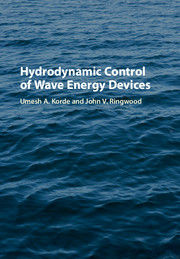Book contents
- Frontmatter
- Contents
- Preface
- Acknowledgments
- Part I Introduction
- Part II The Basics
- Part III The Hydrodynamics
- Part IV Velocity Control Using a Hydrodynamic Model
- Part V Control by Optimizing a Performance Index
- 9 Nonreactive Switching Control
- 10 Optimal Numerical Control of Wave Energy Converters
- 11 Control Strategies for WEC Arrays
- 12 Wave Forecasting for Control
- Part VI Toward Overall WEC System Hydrodynamic Optimization
- Part VII In Closing
- References
- Index
12 - Wave Forecasting for Control
from Part V - Control by Optimizing a Performance Index
Published online by Cambridge University Press: 05 September 2016
- Frontmatter
- Contents
- Preface
- Acknowledgments
- Part I Introduction
- Part II The Basics
- Part III The Hydrodynamics
- Part IV Velocity Control Using a Hydrodynamic Model
- Part V Control by Optimizing a Performance Index
- 9 Nonreactive Switching Control
- 10 Optimal Numerical Control of Wave Energy Converters
- 11 Control Strategies for WEC Arrays
- 12 Wave Forecasting for Control
- Part VI Toward Overall WEC System Hydrodynamic Optimization
- Part VII In Closing
- References
- Index
Summary
Introduction
Energy conversion in most wave energy converters (WECs) is based either on relative oscillation between bodies or on oscillating pressure distributions within fixed or moving chambers. Oscillators generally have pronounced resonances, which enable efficient power absorption over only a restricted range of frequencies. As has been shown in previous chapters, to cope with the variations of wave spectra, a control system can be designed to alter the oscillator dynamics such that the efficient energy conversion occurs over a wide range of wave conditions [194].
The control approach, in the early stages of wave energy research, consisted of frequency domain relationships regulating the dynamics of the system to be tuned for maximum energy absorption at different peak frequencies corresponding to different incoming wave spectra [66, 194]. Although being an advantageous approach for real sea spectra, frequency domain techniques do not generally allow real-time control on a wave-by-wave basis, which can significantly raise the device's productivity and therefore its economical viability. Real-time optimal control can be directly derived from the aforementioned optimal frequency relationships [66, 194]. The main difficulties arise from the fact that the transformation into the time domain results in noncausal transfer functions, so that the conditions for optimal power absorption can be realized only if future motion of the device, or of the future incident wave profile, is known [135, 194, 195], as shown in Chapter 7. However, a variety of suboptimal causal control schemes are also possible, for example, as reported in [112] and Chapter 8.
The problem of short-term wave prediction of the actual wave elevation profile at a specific point of the sea surface, for some seconds into the future, is central to the more general issue of time domain control of WECs. As an example, Fig. 12.1 illustrates a possible digital control scheme for a generic oscillating body, where the controlled variable is its oscillation velocity, u(k), and the control action is performed through a control force F(k).
- Type
- Chapter
- Information
- Hydrodynamic Control of Wave Energy Devices , pp. 257 - 294Publisher: Cambridge University PressPrint publication year: 2016



